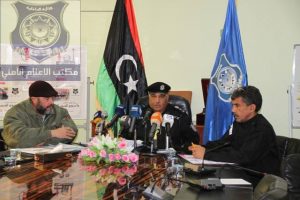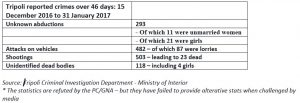By Sami Zaptia.

London, 13 February 2017:
Tripoli’s Security Directorate announced a new security plan for the whole of Greater Tripoli yesterday. The announcement was made at a press conference held at its Tripoli headquarters.
The Tripoli Security Directorate is part of the Ministry of Interior aligned to the Faiez Serraj Presidency Council/Government of National Accord (PC/GNA).
The new security plan will involve the dispersion of security units to ‘‘secure the capital’’. It will also involve plans to secure banks in central Tripoli. The Directorate encouraged the public to use the telephone number 193 in order to report incidents.
On the other hand, the Security Directorate refuted the crime stats recently released by its Criminal Investigations Department, adding that the department that issued those statistics was not an officially recognized body. The Directorate did, however, say that they were in the process of compiling their annual report on crime.

It will be recalled that an entity claiming to be the Tripoli CID of the Ministry of Interior released some very alarming crime figures which they asserted were for Tripoli for a 46-day period from 15 December 2016 to 31 January 2017.
The PC/GNA strongly refuted these crime figures. In response, the media, including Libya Herald, has challenged the Serraj PC/GNA to provide alternative crime statistics for Tripoli/Libya, but they have failed to do so to date. It remains to be seen when and if the Tripoli Security Directorate will release adequate crime statistics in their promised annual report.
Equally, it must be noted that it is not the first time that Tripoli authorities have announced a security plan to impose law and order since the 2011 revolution. On all previous occasions the plan has failed miserably in the face of armed civilians and militias.
What the authorities cannot refute is the fact that crime is rampant in Libya generally, and in Tripoli specifically – in the post-Qaddafi era. There has been a spate of high profile kidnappings in February, for example, that have been highly publicised.
Ali Salem, head of programming at the state-owned Al-Watania TV was seized by unidentified gunmen this month. Another Tripoli kidnap earlier in February was the manager of the Al-Masara Clinic, Dr Abu Ghanem Baruni, who suddenly disappeared. No further details of his abduction are known.
The Audit Bureau in Tripoli has also revealed that their colleague Sami Al-Laafi, was kidnapped on 31 January in Tripoli.
In the eastern city of Shahhat, a former General National Congress member Fawzi Al-Ogab was seized in circumstances that are still unclear.
Meanwhile there is still no news of Kufra House of Representatives member Jibril Awhaidah, who was kidnapped in Tobruk nearly a week ago.
It must be noted that many relatives of kidnap victims either choose not to publicize the kidnapping of their relatives or are warned and threatened by kidnappers to refrain from publicizing the kidnapping. Many kidnappings start and end after a ransom is paid without the incident ever being publicized.
Equally, it is usually the kidnappings of notable persons that receive publicity – many ordinary people who are kidnapped receive no media or social media coverage.







